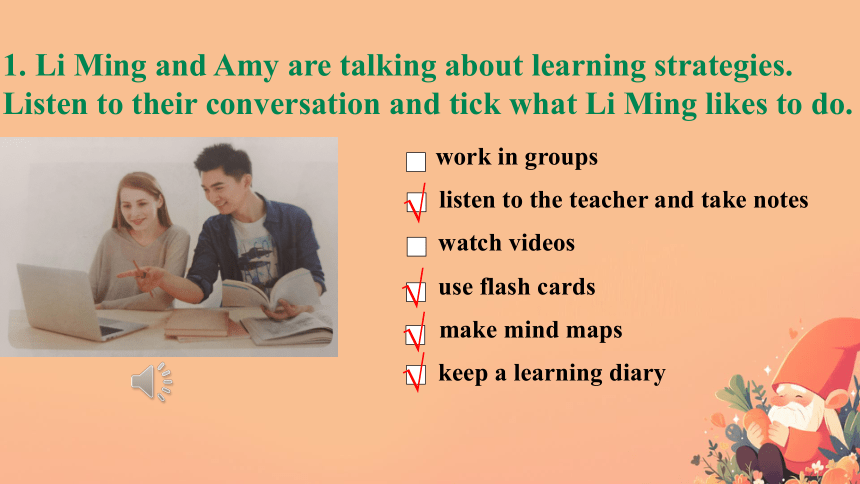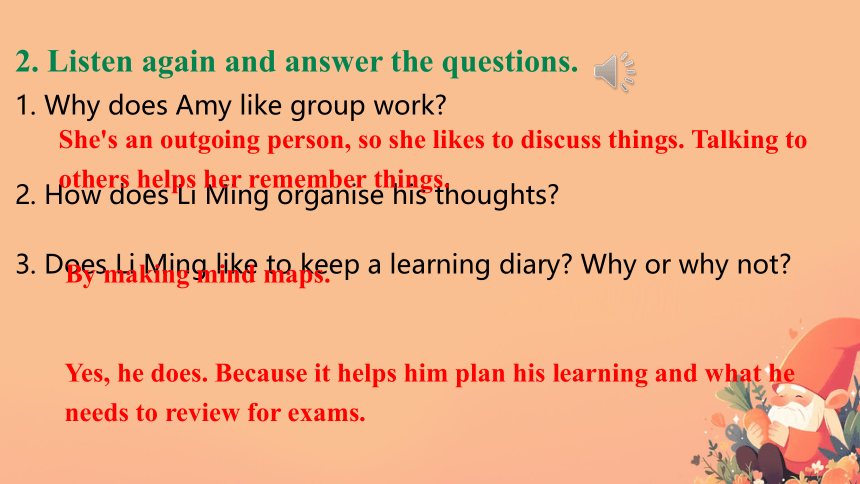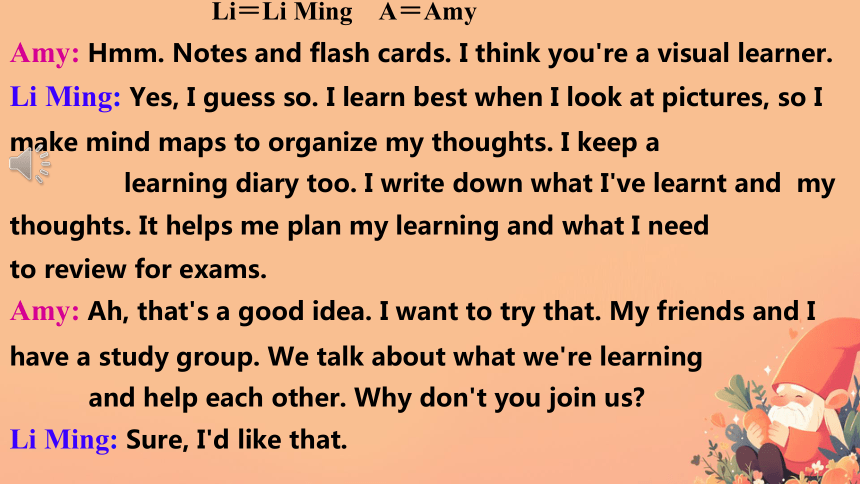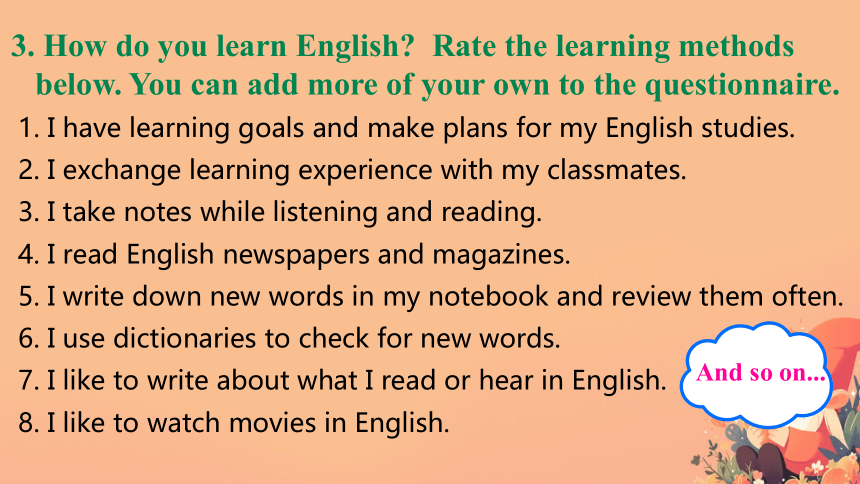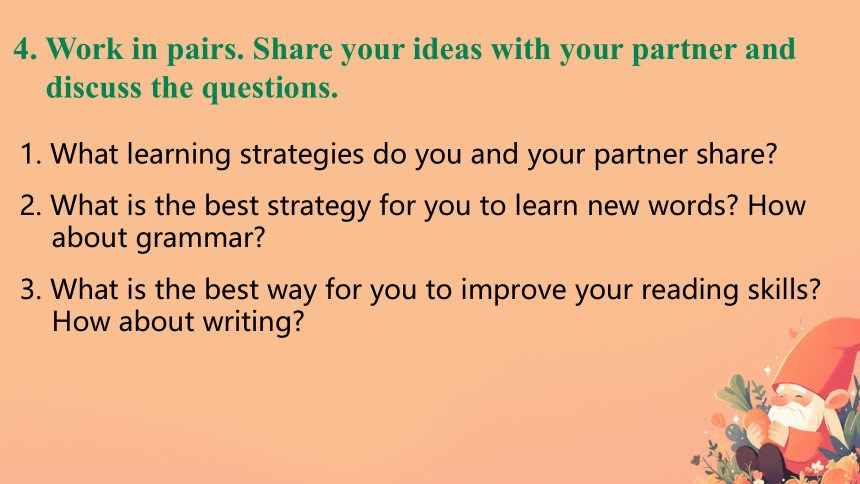 資源簡(jiǎn)介
資源簡(jiǎn)介
(共19張PPT)
Welcome Unit
Listening and Talking
1. Li Ming and Amy are talking about learning strategies. Listen to their conversation and tick what Li Ming likes to do.
work in groups
listen to the teacher and take notes
watch videos
use flash cards
make mind maps
keep a learning diary
√
√
√
√
2. Listen again and answer the questions.
1. Why does Amy like group work
2. How does Li Ming organise his thoughts
3. Does Li Ming like to keep a learning diary Why or why not
She's an outgoing person, so she likes to discuss things. Talking to others helps her remember things.
By making mind maps.
Yes, he does. Because it helps him plan his learning and what he needs to review for exams.
Li=Li Ming A=Amy
Amy: Hi Li Ming. Ready for the test Do you have any study tips for me
Li Ming: Not really. I just listen to the teacher and take notes.
Amy: Oh, group work is my favorite way to learn. I'm an
outgoing person, so I like to discuss things. Talking to
others helps me remember things.
Li Ming: I'm not very good at group work, but I have other
ways of remembering things. I like using flash cards.
They are really effective.
Li=Li Ming A=Amy
Amy: Hmm. Notes and flash cards. I think you're a visual learner. Li Ming: Yes, I guess so. I learn best when I look at pictures, so I make mind maps to organize my thoughts. I keep a
learning diary too. I write down what I've learnt and my thoughts. It helps me plan my learning and what I need to review for exams.
Amy: Ah, that's a good idea. I want to try that. My friends and I have a study group. We talk about what we're learning
and help each other. Why don't you join us
Li Ming: Sure, I'd like that.
1. I have learning goals and make plans for my English studies.
2. I exchange learning experience with my classmates.
3. I take notes while listening and reading.
4. I read English newspapers and magazines.
5. I write down new words in my notebook and review them often.
6. I use dictionaries to check for new words.
7. I like to write about what I read or hear in English.
8. I like to watch movies in English.
3. How do you learn English Rate the learning methods
below. You can add more of your own to the questionnaire.
And so on...
4. Work in pairs. Share your ideas with your partner and
discuss the questions.
1. What learning strategies do you and your partner share
2. What is the best strategy for you to learn new words How
about grammar
3. What is the best way for you to improve your reading skills
How about writing
可數(shù)名詞的復(fù)數(shù)變化規(guī)則
1.一般情況下,在詞尾加-s,如:
book—books(書(shū))
bag—bags(包)
cat—cats(貓)
bed—beds(床)
規(guī)則變化
2.以 s, x, sh, ch 結(jié)尾,在詞尾加-es,如:
bus—buses(公共汽車)
box—boxes(盒子)
brush—brushes(刷子)
watch—watches(手表)
3. ①以“輔音字母+y”結(jié)尾,改 y 為 i, 再加-es,如:
family—families(家庭)
story—stories(故事)
party—parties(故事)
②而以“元音字母+y”結(jié)尾,直接加s,如:
boy—boys(男孩)
day—days(天)
monkey—monkeys(猴子)
元音字母:
a e i o u
4. 一般以f或fe結(jié)尾的詞,將f或fe變?yōu)関再加es.
巧記:妻見(jiàn)小偷架下藏,手拿小刀想殺狼。
wife(wives), thief(thieves), shelf(shelves), knife(knives), wolf(wolves).
誰(shuí)知落下半片葉,砸在頭上一命亡
half(halves), leaf(leaves), life(lives).
但下列單詞直接加“s":
海灣邊、屋頂上,首領(lǐng)奴仆兩相望;
gulf(gulfs), roof(roofs), chief(chiefs), serf(serfs), belief(beliefs);
誰(shuí)說(shuō)他們無(wú)信仰,證據(jù)寫(xiě)在手帕上。
proof(proofs), handkerchief(handkerchiefs).
5. 以 “o” 結(jié)尾的單詞
①一般來(lái)說(shuō)有生命的名詞,在詞尾加-es
②無(wú)生命的名詞,在詞尾加-s
potato—potatoes(土豆) tomato—tomatoes(西紅柿)
volcano – volcanoes (火山) Negro-Negroes(黑人)
mosquito – mosquitoes(蚊子) hero-heroes(英雄)
photo—photos(照片)
radio—radios(收音機(jī))
6. 可數(shù)名詞復(fù)數(shù)不規(guī)則變化
①元音字母發(fā)生變化
man—men(男人)
woman—women(女人)
policeman—policemen(男警察)
policewoman—policewomen(女警察)
foot—feet(腳)
tooth—teeth(牙齒)
不規(guī)則變化
②單復(fù)同形(單復(fù)數(shù)形式無(wú)變化)
fish(魚(yú)) Chinese(中國(guó)人)
sheep(綿羊) yuan(元)
③無(wú)規(guī)律
mouse—mice(老鼠)
child—children(小孩)
Thank you
Byebye !
展開(kāi)更多......
收起↑
 資源預(yù)覽
資源預(yù)覽

